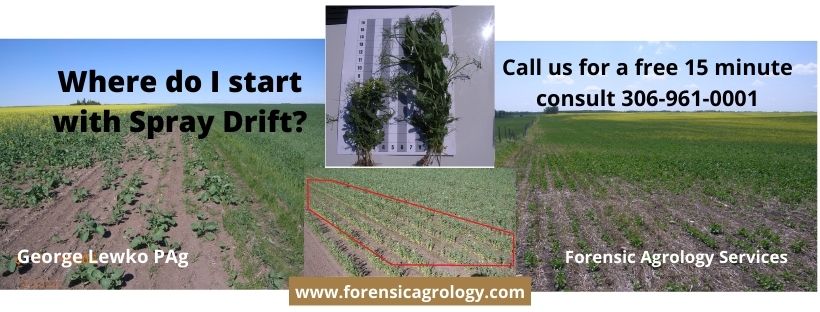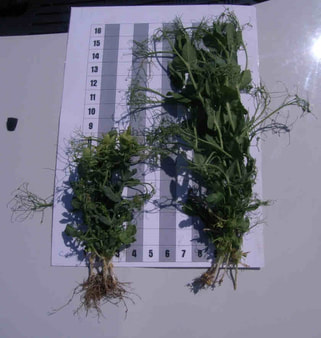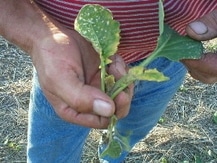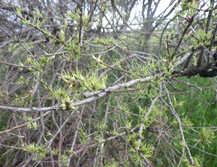By George Lewko PAg Forensic Agrologist
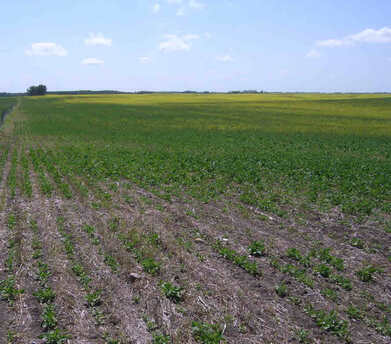 Spray drift starts from the source and gets less as you move away from the source, A fingering pattern often shows up.
Spray drift starts from the source and gets less as you move away from the source, A fingering pattern often shows up.
Sprayers have a duty not to harm themselves, their neighbours or the environment.
Where do I start?
Do a rough estimate of the area affected. If you are not sure GPS the area, (many apps on your phone or handheld devices) and take some good pictures (overall and close-ups of the affected plant). GPS pictures can be very helpful, and you can download apps for your phone (GeoCam is great on Android, GPS Camera App works on an Apple). Spray drift can be ½ acre to 100’s of acres (if an inversion or atmospheric stability is present). Check local weather data. If you are watching an application and suspect a drift, take a video that shows the wind direction and what is happening. Pictures are the best. Most people carry a smartphone, use it.
Where did it come from?
There are always signs of where the drift came from. There can be a shadow effect behind trees or other obstacles or fingers of drift near the edge of the damage. Drift damage will always get less as you move away from the source.
Talk with the neighbour and Insurance and Demand Letters
Talk with the neighbour that was the potential source, many times they have insurance. Insurance companies will want a demand letter, which states the W5’s so they can send out a Forensic Agrologist investigator.
Do I hire my own Investigator?
It depends on the amount of damage. A proper Investigation will cost $3-5,000 for a Forensic Agrologist. Costs depend on distance, time and acres involved. For larger claims or repeat claims, hiring a 3rd party Forensic Agrologist (PAg or Professional Agrologist) is the professional you need. A Professional Agrologist is not an advocate. They are a neutral 3rd party doing an investigation. They provide an expert opinion for the court (if need be) as per the following.
“I have reviewed King’s Bench Rule 5-37 and am aware of my duties as an expert witness before the court. Specifically, I understand that I have a duty to assist the court and am not an advocate for any party. In addition, any evidence I provide must be objective and non-partisan and shall be provided only within my area of expertise. I certify that I have made this report in conformity with the above-noted duties and will, if called on to give oral or written testimony, give that testimony in conformity with those duties.”
Contact a 3rd Party Investigator that's qualified - PAg or Forensic Agrologist. The Saskatchewan Institute of Agrologists (S.I.A.) has a list of Forensic Agrologists and their specialities www.sia.sk.ca https://sia.sk.ca/find-a-forensic-agrologist/
Where do I start?
Do a rough estimate of the area affected. If you are not sure GPS the area, (many apps on your phone or handheld devices) and take some good pictures (overall and close-ups of the affected plant). GPS pictures can be very helpful, and you can download apps for your phone (GeoCam is great on Android, GPS Camera App works on an Apple). Spray drift can be ½ acre to 100’s of acres (if an inversion or atmospheric stability is present). Check local weather data. If you are watching an application and suspect a drift, take a video that shows the wind direction and what is happening. Pictures are the best. Most people carry a smartphone, use it.
Where did it come from?
There are always signs of where the drift came from. There can be a shadow effect behind trees or other obstacles or fingers of drift near the edge of the damage. Drift damage will always get less as you move away from the source.
Talk with the neighbour and Insurance and Demand Letters
Talk with the neighbour that was the potential source, many times they have insurance. Insurance companies will want a demand letter, which states the W5’s so they can send out a Forensic Agrologist investigator.
Do I hire my own Investigator?
It depends on the amount of damage. A proper Investigation will cost $3-5,000 for a Forensic Agrologist. Costs depend on distance, time and acres involved. For larger claims or repeat claims, hiring a 3rd party Forensic Agrologist (PAg or Professional Agrologist) is the professional you need. A Professional Agrologist is not an advocate. They are a neutral 3rd party doing an investigation. They provide an expert opinion for the court (if need be) as per the following.
“I have reviewed King’s Bench Rule 5-37 and am aware of my duties as an expert witness before the court. Specifically, I understand that I have a duty to assist the court and am not an advocate for any party. In addition, any evidence I provide must be objective and non-partisan and shall be provided only within my area of expertise. I certify that I have made this report in conformity with the above-noted duties and will, if called on to give oral or written testimony, give that testimony in conformity with those duties.”
Contact a 3rd Party Investigator that's qualified - PAg or Forensic Agrologist. The Saskatchewan Institute of Agrologists (S.I.A.) has a list of Forensic Agrologists and their specialities www.sia.sk.ca https://sia.sk.ca/find-a-forensic-agrologist/
Most Investigators like to scout the crop as soon as possible to view the extent of the damage. They will GPS the area (100% loss area too), take pictures, maybe samples for 3rd party testing or evaluation, get a field history going back 5 years (to eliminate other sources of damage) and conduct a thorough investigation in the field. If a report is necessary, they will produce one that is suitable for court.
How much Damage?
Regular crops can be $100’s per acre, Organic crops have a 3-year window without Organic Certification which can be $1,000’s per acre, Orchards can be $10,000’s per acre, yard shelterbelts will be $250+ per tree and tree nurseries can be $100,000’s per acre for damage.
How much Damage?
Regular crops can be $100’s per acre, Organic crops have a 3-year window without Organic Certification which can be $1,000’s per acre, Orchards can be $10,000’s per acre, yard shelterbelts will be $250+ per tree and tree nurseries can be $100,000’s per acre for damage.
Other Sources of Inspections
Health Canada, Pesticide Compliance Program
The Pest Management Regulatory Agency (PMRA) is responsible for the registration of all pest control products (PCP’s), the pre-market assessment of new products and the re-evaluation of registered pest control products in Canada. PMRA along with the Registrants or manufactures approve the marketplace labels for all PCP’s. The Health Canada, Pesticide Compliance Program, are the Compliance and Enforcement arm of Pest Management Regulatory Agency and are responsible for enforcing the Federal Pest Control Products Act and Regulations. Inspectors verify compliance of importers, manufactures, distributors, exporters and users with the federal requirements. The Pesticide Compliance Program Inspectors are responsible for enforcing the label requirements. The regulation of pesticides is a shared responsibility between the Federal, Provincial and Municipal governments in all provinces. Should a complaint be reported to the Pesticide Compliance Program, the complainant is asked to complete a complaint form. The form includes names of parties involved, contact information, location and other pertinent information about the alleged drift complaint. Soil or tissue samples may be collected and sent to the PMRA lab in Ottawa where they are analyzed for hundreds of active ingredients. The Pesticide Compliance Program does not assess or calculate damages or losses as a result of pesticide damage and will always recommend you hire or consult a Forensic Agrologist. The Pesticide Compliance Program Inspectors use a graduated approach to enforcement with education, warning letters, compliance order, notice of violations or Administrative Monetary Penalties (AMP’s) with fines set at $10,000 per violation.
You can report an incident online the Health Canada by filling out an incident report form.
"The Agriculture and Agri-Food Administrative Monetary Penalties (AMPS) Act provides a system of penalties and warnings for violations of several federal Acts including the Pest Control Products Act, which regulates pesticides. AMPS Act allows Canadian pesticide regulatory officials to impose penalties without having to pursue formal prosecution." From Health Canada Enforcement Bulletin website.
Saskatchewan Ministry of Agriculture, Provincial Pesticide Investigator is now a Forensic Agrologist
"If the applicator is a commercial applicator, the incident would fall under the jurisdiction of the Ministry of Agriculture, by the Forensic Agrologist. You can report an incident by contacting the Provincial Forensic Agrologist Investigator and requesting an incident report form." From the Saskatchewan.ca Government website.
"Contact for pesticide drift, misapplication, misuse or unsafe practice by a licensed applicator or contraventions to The Pest Control Products (Saskatchewan) Act and the associated Pest Control Products Regulations 2015." From the Saskatchewan.ca Government website.
Igor de Albuquerque AAg Forensic Agrologist for the Saskatchewan Ministry of Agriculture. Contact Igor at 306-787-8711 or Email [email protected] Room 125 - 3085 Albert St., Regina, SK, S4S 0B1.
The Saskatchewan Minstry of Agriculture Forensic Agrologist will not establish damages, but can confirm that damage was done and can demand the spray records for the potential source. They may investigate or inspect. They might send samples for visual analysis to the Saskatchewan Crop Protection Laboratory in Regina. They will give you a list of Forensic Agrologists from the SIA website to help you with further Investigations, as the ministry will not provide assistance in matters of compensation.
This is a link to the Saskatchewan Pesticide Investigations and Regulations webpage
Here is a link to the Provincial Pesticide Incident Report Form.
Saskatchewan Crop Protection Laboratory
You can submit your own samples to the Saskatchewan Crop Protection Laboratory too for visual assessment. There is a small cost. https://www.saskatchewan.ca/business/agriculture-natural-resources-and-industry/agribusiness-farmers-and-ranchers/programs-and-services/crops-programs/crop-protection-laboratory-services
Transport Canada
The flight of an aircraft while performing a pesticide application, including but not limited to low-flying aircraft and flying over built-up areas or towns.
Civil Aviation Communications Centre
Prairie Regional Service Centre
[email protected]
Toll-free: 1-888-463-0521
Amount of damage will lead you to?
Always seek legal advice from a professional. Here are a few things I have noted. You have 2 years to launch a lawsuit in Saskatchewan. Saskatchewan Small Claims Court allows up to $30,000 in damages. Many lawyers will want the claim to be over $100,000 to cover costs (their fees) and could take years to settle. There are a number of advantages to having a lawyer on your side, but there is a cost to good legal professional. The lawyer will hire a Forensic Agrologist to make a report.
Health Canada, Pesticide Compliance Program
The Pest Management Regulatory Agency (PMRA) is responsible for the registration of all pest control products (PCP’s), the pre-market assessment of new products and the re-evaluation of registered pest control products in Canada. PMRA along with the Registrants or manufactures approve the marketplace labels for all PCP’s. The Health Canada, Pesticide Compliance Program, are the Compliance and Enforcement arm of Pest Management Regulatory Agency and are responsible for enforcing the Federal Pest Control Products Act and Regulations. Inspectors verify compliance of importers, manufactures, distributors, exporters and users with the federal requirements. The Pesticide Compliance Program Inspectors are responsible for enforcing the label requirements. The regulation of pesticides is a shared responsibility between the Federal, Provincial and Municipal governments in all provinces. Should a complaint be reported to the Pesticide Compliance Program, the complainant is asked to complete a complaint form. The form includes names of parties involved, contact information, location and other pertinent information about the alleged drift complaint. Soil or tissue samples may be collected and sent to the PMRA lab in Ottawa where they are analyzed for hundreds of active ingredients. The Pesticide Compliance Program does not assess or calculate damages or losses as a result of pesticide damage and will always recommend you hire or consult a Forensic Agrologist. The Pesticide Compliance Program Inspectors use a graduated approach to enforcement with education, warning letters, compliance order, notice of violations or Administrative Monetary Penalties (AMP’s) with fines set at $10,000 per violation.
You can report an incident online the Health Canada by filling out an incident report form.
"The Agriculture and Agri-Food Administrative Monetary Penalties (AMPS) Act provides a system of penalties and warnings for violations of several federal Acts including the Pest Control Products Act, which regulates pesticides. AMPS Act allows Canadian pesticide regulatory officials to impose penalties without having to pursue formal prosecution." From Health Canada Enforcement Bulletin website.
Saskatchewan Ministry of Agriculture, Provincial Pesticide Investigator is now a Forensic Agrologist
"If the applicator is a commercial applicator, the incident would fall under the jurisdiction of the Ministry of Agriculture, by the Forensic Agrologist. You can report an incident by contacting the Provincial Forensic Agrologist Investigator and requesting an incident report form." From the Saskatchewan.ca Government website.
"Contact for pesticide drift, misapplication, misuse or unsafe practice by a licensed applicator or contraventions to The Pest Control Products (Saskatchewan) Act and the associated Pest Control Products Regulations 2015." From the Saskatchewan.ca Government website.
Igor de Albuquerque AAg Forensic Agrologist for the Saskatchewan Ministry of Agriculture. Contact Igor at 306-787-8711 or Email [email protected] Room 125 - 3085 Albert St., Regina, SK, S4S 0B1.
The Saskatchewan Minstry of Agriculture Forensic Agrologist will not establish damages, but can confirm that damage was done and can demand the spray records for the potential source. They may investigate or inspect. They might send samples for visual analysis to the Saskatchewan Crop Protection Laboratory in Regina. They will give you a list of Forensic Agrologists from the SIA website to help you with further Investigations, as the ministry will not provide assistance in matters of compensation.
This is a link to the Saskatchewan Pesticide Investigations and Regulations webpage
Here is a link to the Provincial Pesticide Incident Report Form.
Saskatchewan Crop Protection Laboratory
You can submit your own samples to the Saskatchewan Crop Protection Laboratory too for visual assessment. There is a small cost. https://www.saskatchewan.ca/business/agriculture-natural-resources-and-industry/agribusiness-farmers-and-ranchers/programs-and-services/crops-programs/crop-protection-laboratory-services
Transport Canada
The flight of an aircraft while performing a pesticide application, including but not limited to low-flying aircraft and flying over built-up areas or towns.
Civil Aviation Communications Centre
Prairie Regional Service Centre
[email protected]
Toll-free: 1-888-463-0521
Amount of damage will lead you to?
Always seek legal advice from a professional. Here are a few things I have noted. You have 2 years to launch a lawsuit in Saskatchewan. Saskatchewan Small Claims Court allows up to $30,000 in damages. Many lawyers will want the claim to be over $100,000 to cover costs (their fees) and could take years to settle. There are a number of advantages to having a lawyer on your side, but there is a cost to good legal professional. The lawyer will hire a Forensic Agrologist to make a report.
Drift Watch www.driftwatch.org
Hopefully, in Saskatchewan every spray operator, Organic producer, sensitive crop producer and beekeeper are using this platform. It’s free and encouraged to be used. All specialty crops, organic and sensitive crops should be listed, as well as bee hives as well. It all started at Perdue University and now is a national and international collaborative. FieldWatch, Inc. is a non-profit company.
“Communication + Cooperation + Collaboration = Successful Co-existence. This site [Driftwatch] is a voluntary communication tool that enables crop producers, beekeepers, and pesticide applicators to work together to protect specialty crops and apiaries through use of mapping programs. It is not a substitute for any state [provincial] regulatory requirements.”
Sask Polytechnic Pesticide Applicator Courses
Sask Polytechnic offers a number of Pesticide Applicator Courses, for farmers the Ag Applicator is the main course for commercial applicators, maybe the Aerial Applicator as well. These are home study (online registration, a home study from a manual and write the exam in the local Sask Polytechnic or affiliate) and classroom training, either a 2-day refresher or a 4-day full course, and are generally offered in March-April of each year. Farmers are not required to have these course while applying Pesticides to their own land. As soon as the spraying becomes a custom job for pay, a License is required, and one of these Pesticide Applicator Courses are required to get a Pesticide Applicator License. https://saskpolytech.ca/programs-and-courses/part-time-studies/pesticide.aspx
Give us a call for a Free 15-minute consultation 306-961-0001. We have helped with over 400 cases during the last 14 years.
Hopefully, in Saskatchewan every spray operator, Organic producer, sensitive crop producer and beekeeper are using this platform. It’s free and encouraged to be used. All specialty crops, organic and sensitive crops should be listed, as well as bee hives as well. It all started at Perdue University and now is a national and international collaborative. FieldWatch, Inc. is a non-profit company.
“Communication + Cooperation + Collaboration = Successful Co-existence. This site [Driftwatch] is a voluntary communication tool that enables crop producers, beekeepers, and pesticide applicators to work together to protect specialty crops and apiaries through use of mapping programs. It is not a substitute for any state [provincial] regulatory requirements.”
Sask Polytechnic Pesticide Applicator Courses
Sask Polytechnic offers a number of Pesticide Applicator Courses, for farmers the Ag Applicator is the main course for commercial applicators, maybe the Aerial Applicator as well. These are home study (online registration, a home study from a manual and write the exam in the local Sask Polytechnic or affiliate) and classroom training, either a 2-day refresher or a 4-day full course, and are generally offered in March-April of each year. Farmers are not required to have these course while applying Pesticides to their own land. As soon as the spraying becomes a custom job for pay, a License is required, and one of these Pesticide Applicator Courses are required to get a Pesticide Applicator License. https://saskpolytech.ca/programs-and-courses/part-time-studies/pesticide.aspx
Give us a call for a Free 15-minute consultation 306-961-0001. We have helped with over 400 cases during the last 14 years.
